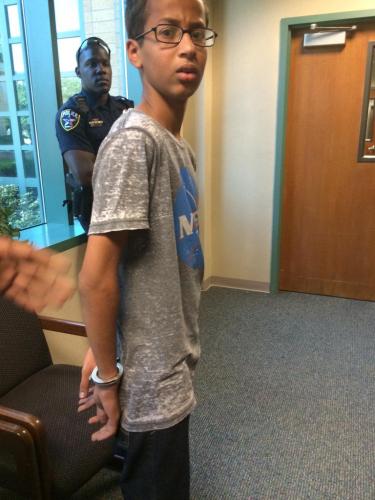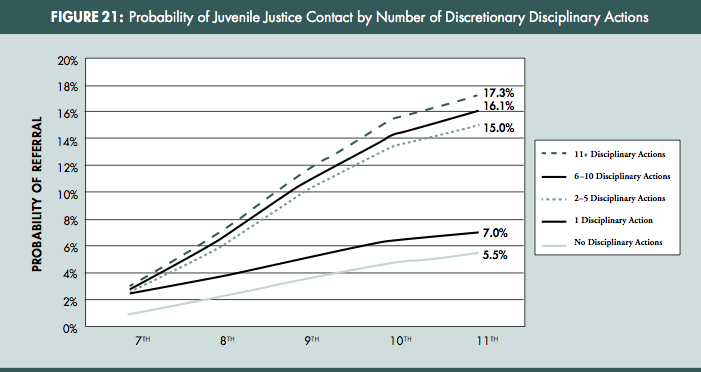Ahmed and us at the Robotics Competition in Dallas #IStandWithAhmed pic.twitter.com/SkI3I8DDo8
— مرام (@sudanibae) September 16, 2015
When I was in middle school, I was way into model rocketry. My best friend and I would build these elaborate rocket kits, then (having researched the pertinent ordinances) launch them from approved areas of public parks. We even started up a 4-H club on model rocketry, though it never really took off (as it were).
One day, we were walking through our New Jersey suburb on our way to a park to do a launch, rockets and wires and so forth poking out of our backpacks. A police car rolled up next to us, and the officer asked what we were up to. I don’t recall whether we flashed our hand-made rocket club membership cards, but we explained what we planned to do, and what we had researched about how to do a safe and legal launch. He let us go with a wave.
Had we done the same today, the result would likely be different. In our post-9/11 haze, the officer would probably zero in on my friend’s Pakistani ancestry and the dangerous look of all those rockets and incendiary engines. My own scruffiness wouldn’t help.
 A photo shared by Ahmed Mohamed's family, of Mohamed in cuffs at the police station for building a clock. Image via Anil Dash's Twitter stream.
A photo shared by Ahmed Mohamed's family, of Mohamed in cuffs at the police station for building a clock. Image via Anil Dash's Twitter stream.The absurd persecution of Irving, Texas, student Ahmed Mohamed stirred up that memory. Mohamed, who started a model robotics club in middle school, wanted to impress his 9th-grade engineering teacher. So he built a digital clock and brought it to class. The teacher was suitably impressed, but warned the student not to show the clock—wired into a pencil case—to other teachers. But when the alarm started beeping in a later class, the jig was up. According to his interview with the Dallas Morning News:
 Image of the clock, distributed by the Irving, TX police department.
Image of the clock, distributed by the Irving, TX police department.“She was like, it looks like a bomb,” he said.
“I told her, ‘It doesn’t look like a bomb to me.’”
The clock was confiscated, and a few hours later, Mohamed was taken out of class and interrogated by police without access to his parents or legal counsel. The Muslim student of Sudanese descent was handcuffed, paraded through the school, and hauled off to city jail, all while wearing his NASA t-shirt.
“He just wants to invent good things for mankind,” Mohamed’s father, Mohamed Elhassan Mohamed, told the News. In a letter to parents, the school district described responding to a suspicious-looking item,” not clarifying whether the clock or the child inspired their suspicion; they suspended Mohamed for three days. The police department has declined to press charges (having earlier threatened charges for building a “hoax bomb”). Scientists at NASA, MIT, tech companies, and other engineering mainstays have offered their help when Mohamed is ready for college or a career in engineering, and President Obama asked Mohamed to show him the clock at the White House.
There’s a lot to unpack in this incident. The district failed to abide by its own policies (which forbid “false accusations,” encourages punishment to be balanced by a student’s disciplinary record, and recommends “discipline techniques that keep the student in the best educational environment–the classroom”). The student’s teachers, school administrators, and town police apparently couldn’t tell a clock from a bomb, which is scary. And they couldn’t tell an enthusiastic student from a terrorist, which may be worse.
It’s hard to imagine they’d have made the same mistake if Ahmed Mohamed was named James Smith, if his ancestry weren’t Arab (from sub-Saharan Africa), or if his complexion a bit paler. Nor is it likely he’d have faced the same scrutiny and punishment under those circumstances.
I was also struck by Mohamed’s remark to the News: “He remembers the shocked expression of his student counselor—the one ‘who knows I’m a good boy.’” There were people present with the power to advocate on his behalf, but they stood silent in the face of injustice. That’s a powerful lesson for a 9th grader, one unlikely to be outweighed by the subsequent outpouring of support.
 Data from Breaking Schools' Rules: A Statewide Study on How School Discipline Relates to Students' Success and Juvenile Justice Involvement showing the effect of detentions on students' contact with the criminal justice system.
Data from Breaking Schools' Rules: A Statewide Study on How School Discipline Relates to Students' Success and Juvenile Justice Involvement showing the effect of detentions on students' contact with the criminal justice system.It’s also a reminder of the tragic consequences of “zero tolerance” policies adopted by many districts since the ‘90s. Where once a district could have kept the police from getting involved, and could have reconsidered disciplining Mohamed once they realized that there had been a misunderstanding, these policies take away that discretion. These policies transform discipline problems into legal problems, a school’s “permanent record” into a criminal record. That has dramatic consequences.
A groundbreaking study of Texas disciplinary records found that a shocking six in ten students had been suspended or expelled from school because of some infraction. You’ll be shocked to learn that there’s a racial disparity: controlling for 83 other variables, they found that African American students were still 31% more likely to be disciplined than comparable students of other races. Controlling for the differences between students and districts, students who were disciplined were three times as likely to be involved in the criminal justice system in the subsequent year. It’s not surprising that if you force students out of class, they might have more time for and inclination toward subsequent mischief. And a student’s disciplinary record can be used against him or her in criminal proceedings. These policies thus shunt certain students (racial minorities and students with disabilities, most notably) out of classrooms, into jails, and set them on a course for prison, rather than college.
Ahmed Mohamed is unlikely to wind up anywhere other than a top college at this point. (Just imagine the application essays he’ll write!) But students like him, students from non-European backgrounds, practicing non-Christian religions, and engaging in non-standard hobbies, can easily be set on a course that deprives them of the education and opportunities they deserve. Not all of them wind up at the center of a social media maelstrom, and some wind up in trouble as a result of their own misconduct. Rather than helping direct impressionable young people away from trouble, the systems in place exclude them from the help and support they need. (Zero-tolerance policies were originally promoted as a response to the utterly discredited idea of “super-predators,” irredeemable youth who needed to be imprisoned as early as possible. The idea never made sense, failed to generate any empirical support, and is generally derided now, but the policies it inspired still cause harm decades later).
For those of us concerned about STEM education, the incident in Irving is troublesome. Ahmed Mohamed probably won’t lose his love of engineering over his ill treatment, but what lesson did other students in his school learn from it? Are they more likely to experiment with electronics now, or will they see science as dangerous, scary, and even shameful? I’m thinking especially of other students of color in his school, and how the accumulation of incidents like this (including a highly-publicized similar incident from 2013) push them away from science classrooms, away from any interest in STEM careers, away from a personal interest in science. The role of racial, ethnic, and religious bias here is hard to escape, and even with all the support Mohamed has received after his disgraceful treatment, that mistreatment is likely to linger in the memories of a lot of people who recognize themselves in Mohamed. Ahmed Mohamed did what every science teacher should want students to do, and I can only hope his science teachers are fighting for him and others like him behind the scenes.
Ahmed Mohamed will come out of this all right. Early Wednesday morning, he tweeted: “Thank you for your support! I really didn’t think people would care about a muslim boy. #Thankyouforstandingwithme #IStandWithAhmed.” At a press conference he appeared strong, confident, and excited to transfer to a new school. I worry more about all the boys and girls who have encountered similar discrimination, especially the victims of racism, stereotypes about nerds and science, and out-dated and ineffective zero-tolerance policies. I stand with Ahmed, and I hope that we will stand with all those others, too.

